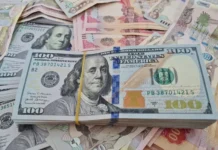Good Morning ,
Out with the Old, In with the New: Global Shifts Point Toward an Asset-Backed Reset
Political upheaval, social unrest, and financial instability are converging to push nations toward gold and commodity-backed systems.
Cracks in the Old Order
Across the globe, nations are experiencing political turbulence and financial strain that reflect a deeper systemic shift. France has faced mass protests, leadership under pressure, and calls for a new constitution as frustration with inequality and EU policies mounts.
Other countries show similar signs:
- Germany – economic slowdown and energy dependency challenges.
- Italy and Spain – political instability and surging nationalist movements.
- United Kingdom – post-Brexit financial strain, leadership shakeups, and inflation battles.
- United States – debt crisis, Federal Reserve scrutiny, and debates over a digital dollar.
The common theme is clear: traditional governance and fiat-based economic systems are under strain, and populations are rejecting “business as usual.”
The People Rise Up
Public frustration is no longer limited to economic complaints — it’s spilling into the streets. In London, a “Unite the Kingdom” rally led by activist Tommy Robinson drew more than 100,000 people, with unofficial estimates placing the crowd in the millions. Protesters framed the march around migration, free speech, and national identity. Signs reading “Freedom of speech is dead. RIP Charlie Kirk” highlighted how the recent assassination of U.S. conservative activist Charlie Kirk has become a rallying cry across borders.
Meanwhile in Spain, the Vuelta cycling race became a stage for anti-Israel protests. Demonstrators waving Palestinian flags interrupted multiple stages, demanding international accountability for Gaza and calling for the expulsion of Israel’s team from the race. These protests, tacitly endorsed by Spain’s government, escalated into a diplomatic standoff with Israel — showing how grassroots uprisings are now capable of shifting state-level policy.
From London’s nationalists to Spain’s pro-Palestinian activists, the message is similar: citizens no longer trust their governments or global institutions to represent them, and are forcing their voices into the spotlight.
The Fiat System at a Breaking Point
Decades of debt-fueled monetary policy and central bank dominance appear to be reaching their limits. Nations burdened with unsustainable debt are edging closer to default. The cracks in the fiat model are accelerating the search for alternatives.
The Push Toward Asset-Backed Finance
BRICS and its expanding membership — including countries like Saudi Arabia, Egypt, and the UAE — are openly advancing gold-backed trade settlement. Commodities, particularly oil and gold, are reemerging as the anchors of global exchange, replacing the “paper promises” of fiat currency.
This transition is not just financial but political. In France, the potential collapse of the Fifth Republic could pave the way for a Sixth Republic shaped by new economic alignments, perhaps closer to BRICS models.
Global Power Realignment
The shift from “old guard” to “new system” is underway:
- IMF, BIS, and G7 dominance is waning.
- Sovereign wealth funds and asset-backed currencies are gaining traction.
- Central banks face pressure to adapt, with gold now recognized as a tier-1 asset under Basel III standards.
Leadership changes are only the surface; the deeper transformation lies in the control of money and credit. If a nation like France reorients its financial system, ripple effects could reshape the EU, NATO, and the global balance of power.
Proof and Reality Check
There is undeniable evidence of instability: widespread protests, resignations, assassinations, and the rise of BRICS’ gold-based trade mechanisms. Citizens are openly challenging their governments, while governments themselves are repositioning financially and diplomatically. Yet, while the pieces of a new financial order are falling into place, there is no definitive proof of a single coordinated system set to roll out immediately. The global shift remains in motion — marked by positioning, negotiations, and speculation.
Why This Matters
From Europe to the U.S. to BRICS, the story is the same: the old fiat model is faltering, and asset-backed systems are emerging as the next chapter in global finance. The uprisings in London and Spain are not isolated events — they are symptoms of a deeper rupture between governments, people, and the financial order underpinning them. The world may soon witness a coordinated reset where sovereignty, real assets, and multipolar structures replace the debt-driven order of the past.
This is not just politics — it’s global finance restructuring before our eyes.
@ Newshounds News™ Exclusive
Sources:
~~~~~~~~~
US Senators Accuse JPMorgan Chase, Bank of America, Wells Fargo of Threatening US Financial Stability and Risking Another Taxpayer Bailout – Here’s Why
Warren and Sanders warn that megabank stock buybacks and dividend hikes are setting the stage for another financial crisis.
Senators Sound the Alarm
U.S. Senators Elizabeth Warren (D-MA) and Bernie Sanders (I-VT) are taking aim at the nation’s largest banks, accusing them of placing the “entire economy at risk” through massive stock buyback programs and dividend increases.
The senators argue that JPMorgan Chase, Bank of America, Wells Fargo, Citigroup, Goldman Sachs, and Morgan Stanley are prioritizing wealthy shareholders and executives over financial stability and consumer benefits.
The Numbers Behind the Accusation
- JPMorgan Chase: $50 billion stock buyback, dividend increase of 7.1%
- Bank of America: $40 billion stock buyback, dividend increase of 7.6%
- Wells Fargo: $40 billion stock buyback, dividend increase of 12.5%
- Citigroup: $20 billion stock buyback, dividend increase of 7.1%
- Goldman Sachs: $40 billion stock buyback, dividend increase of 33%
- Morgan Stanley: $20 billion stock buyback, dividend increase of 8.1%
In total, these megabanks are directing roughly $210 billion to shareholder enrichment.
Echoes of 2008
Warren and Sanders stress that the rollback of capital requirements under the Trump administration has left Wall Street dangerously exposed. Reduced buffers increase susceptibility to economic shocks and raise the likelihood of another government bailout.
They warn that undercapitalization of major banks was a root cause of the 2008 financial crisis and the deep recession that followed.
Why This Matters
While Wall Street celebrates higher dividends, critics argue that these practices are draining capital from the system instead of fortifying it. If another crisis emerges, taxpayers could once again be forced to foot the bill for bailouts.
This is not just politics — it’s global finance restructuring before our eyes.
@ Newshounds News™
Source: Daily Hodl
~~~~~~~~~
Trump Warns NATO: Russian Oil Buys Are “Shocking,” Threatens Harsh Sanctions
Trump pushes NATO to stop Russian oil imports and proposes steep tariffs on China as geopolitical tensions rise.
Trump Targets NATO’s Russian Oil Purchases
President Trump has criticized NATO allies for continuing to buy Russian oil, calling the purchases “shocking” and a sign of weak commitment to defeating Russia. He warned that he is prepared to impose major sanctions on Moscow — but only if all NATO members act together.
Trump argued that by buying Russian oil, NATO allies weaken their negotiating power and prolong the war in Ukraine.
Proposed Tariffs on China
In addition, Trump has urged NATO to adopt sweeping tariffs of 50–100% on China until the war ends. He says such measures would pressure Beijing to abandon its support for Moscow and accelerate a resolution.
Trump also reiterated that the war “would never have started” under his presidency, placing blame on President Biden and Ukraine’s President Zelenskyy.
Rising Pressure on Putin
In a Fox News interview, Trump warned that his patience with Russian President Vladimir Putin is “running out fast.” He has previously threatened to sanction countries that buy Russian oil, including China and India. While he placed a 25% tariff on Indian goods for continuing to import Russian oil, he has not taken equivalent measures against Beijing.
Escalating Tensions in Europe
Recent Russian drone incursions into Polish airspace — a NATO member — have heightened tensions. The U.S. has reaffirmed its pledge to defend “every inch of NATO territory.” Meanwhile, peace talks remain stalled as Ukrainian President Zelenskyy insists that Russia still seeks to seize all of Ukraine.
Crypto Market Reaction
Despite the geopolitical volatility, crypto markets remain steady.
- Bitcoin has held above $115,000
- Altcoins are trading in green, fueling talk of a potential “Altcoin season”
- Global crypto market cap: $4.19 trillion, up 1.9% in the past 24 hours
Investor commentary highlights that U.S. markets overall are hitting record highs across gold, equities, and money supply (M2), while the national debt climbs and inflation remains at 2.9% — still above the Fed’s target.
Why This Matters
Trump’s proposals merge energy, trade, and geopolitics into a single pressure campaign with global consequences. From oil flows to tariffs to crypto resilience, his words continue to ripple across markets and alliances.
This is not just politics — it’s global finance restructuring before our eyes.
@ Newshounds News™
Source: Coinpedia
~~~~~~~~~
BRICS Grows As 1,700 Banks Process 175 Trillion Chinese Yuan Payments
China’s CIPS payment system is accelerating global de-dollarization, with record cross-border yuan transactions.
Record Growth in CIPS Payments
BRICS member China’s Cross-Border Interbank Payment System (CIPS) processed more than 175 trillion Chinese yuan ($24 trillion) in payments, according to The Economist. This marks a 43% jump from 2023, as over 1,700 banks worldwide now participate in the yuan-based payment network.
Banks from countries including Turkey, Mauritius, and BRICS member UAE are actively facilitating yuan transactions. CIPS has also expanded into Africa and the Middle East, extending its reach across 33 market sectors — most operated by Chinese institutions.
China’s Push for Yuan Dominance
CIPS serves as a clearing and settlement infrastructure for cross-border yuan transactions, directly challenging the U.S. dollar’s role in global trade. By allowing manufacturers and international businesses to settle in yuan, China is reducing dependence on the greenback while strengthening its financial self-reliance.
The Xi Jinping administration has aggressively promoted the yuan within BRICS and beyond, with the goal of embedding it into global trade networks.
Dollar Distrust Deepens
Emerging economies are increasingly wary of the U.S. dollar, citing Washington’s use of the currency as a geopolitical weapon. Trump-era tariffs and ongoing trade wars have only reinforced this distrust. As a result, countries are accelerating settlement in yuan and other local currencies, moving away from dollar-based transactions.
Why This Matters
The rapid growth of CIPS highlights how BRICS is steadily building an alternative to the dollar-dominated financial system. If yuan settlements continue to surge, the U.S. dollar could face a historic decline, with ripple effects that may reshape global markets and fuel inflationary pressures in the American economy.
This is not just politics — it’s global finance restructuring before our eyes.
@ Newshounds News™
Source: Watcher Guru
~~~~~~~~~
Seeds of Wisdom Team RV Currency Facts Youtube and Rumble
Newshound’s News Telegram Room Link
Follow the Roadmap
Follow the Timeline
Seeds of Wisdom Team™ Website






